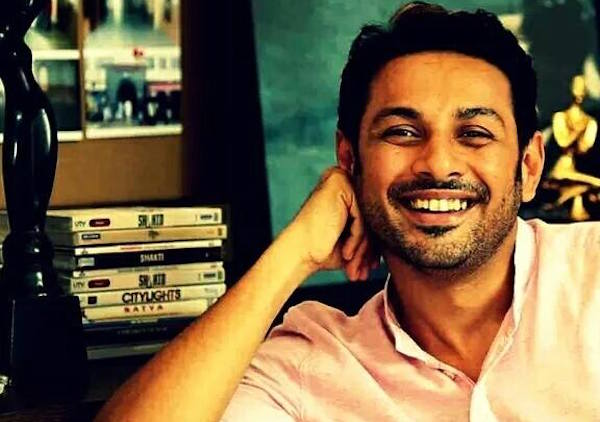Making crowd-pleasing entertainers while retaining the serious core of the story is no easy task: Apurva Asrani
Creating a lucid experience for the audience is a challenging task in itself, especially when it is about an existing person or situation. It is this challenge and the reach of these real-life inspired stories that draws Writer and National Award-winning Editor Apurva Asrani.
After bringing a tragic story to fore though the hard-hitting Aligarh, Apurva has now penned Hansal Mehta’s Simran, which is again inspired by a real incidents. In a chat with Pandolin, he delves deeper into his style of writing, his relationship with Hansal Mehta, and his views on biopics among other things.

Apurva Asrani, Writer (Image Source – Apurva Asrani’s Facebook)
What was the thought behind penning Simran? What convinced you that it was worthy of being made into a film?
Hansal Mehta sent me a news story in May 2015 about Sandeep Kaur, an Indian girl in the US who robbed a slew of banks. I was fascinated by her daring, and equally fascinated by the ludicrousness of the situation.
How could a girl, of average intelligence and with no mean-streak in her body, pull off these heists in the most casual manner, that too without the use of a firearm? All this because she understood and exploited the fear psychosis that has gripped the American people. I thought this aspect of the story to be most entertaining.
And when I traveled to America to research, I found that Sandeep’s story wasn’t unique. Most bank robberies were committed in this manner, by unassuming people and without the use of a weapon. I jumped right into writing it.
The biggest obstacle a writer can face is the possibility of staying too true to the original sequence of events
You have written about reality in a vivid manner. What drives you towards writing about real people?
In the last few years, I’ve noticed a shift in the kind of stories we are telling. They are mostly inspired from newspaper headlines. Some of my films, Shahid, Jalpari, Children Of War and Aligarh are based on true stories and they have been well received. That’s because the audience is finally ready to look in the mirror, and that fact is evident from the TRP’s on news channels and reality shows.
And these films don’t just garner respect from the audiences, they also have a very long shelf life and are used to reference a particular person, incident or statistic. I find these kind of films more interesting than a film that will make a big noise in its first week, and then be forgotten.
In films inspired by real events, the person or situation being written about has a truth that it beholds. How challenging is it to write such stories?
As a writer or a filmmaker you have a huge responsibility towards the real person or story. You have to find the essence of the character and your intent has to be clean. You cannot exploit a real person for monetary benefit; it only works if you are willing to go into the mind of the character and see him/her objectively. You have to try and find their unique spirit and hold their story upto society, so that they can relate to it in some way or the other.
I love it when I see people like Aamir Khan and Akshay Kumar manage to make crowd-pleasing entertainers while retaining the more serious core of the story
In such stories, what are the chances of taking creative liberty as a writer? What aspects did you creatively play with in Simran?
Naturally there must be creative liberty, cinema is meant for entertainment. Otherwise the film should be presented as a documentary or a news story. Besides, how do you know what went on in the bedroom of the character, how he or she loved and what their inner/invisible struggles were?
This is where you come in as a writer, and you put your own stories and struggles in there. In Simran, for example, I introduced the idea of making her a divorcee, because my sister has been dealing with a divorce and is trying to find her way back into the society she once belonged to.
I have an equation with my father where I love him but I also feel I can’t depend on him if I want to say, buy a home. He wanted me to do it myself and I expected support. I put some of these aspirations and conflicts into Simran. But while you do all of this, you have to try not to lose the essence of the original story and character. The instinct you had when you first read it must be preserved.
How could a girl, of average intelligence and with no mean-streak in her body, pull off these heists in the most casual manner, that too without the use of a firearm?
What obstacles does a writer face while writing real life stories? How did you come across solutions to these obstacles?
The biggest obstacle a writer can face is the possibility of staying too true to the original sequence of events. One has to detach at some point, or nothing new will be discovered. The writer has to make it his own or it might not feel authentic.
How involved are you during the casting process of the films that you write?
I’m not involved in the casting at all. But the director often shares ideas with me and I offer my opinion. Sometimes I send the director photos of actors who might suit the character. But I don’t think writers have the right kind of objectivity for this process, since they maybe too attached to characters they’ve created.
Someone has to interpret those characters and that’s why we have skilled professionals like Mukesh Chhabra. I’m always stumped by how he manages to find the right faces for my characters. Getting Manoj Bajpayee to play the gay Professor Siras was his historical casting coup.
I see writers fighting for their rights today and that gives me courage to fight my own battles
You’ve had a long standing association with Director Hansal Mehta. How has your relationship evolved over the years?
20 years and six films later we got to a place where we had given each other our all. I’m very grateful that it resulted in some memorable films. But I think we were also itching to break away and explore new collaborations.

(File Photo) Apurva Asrani and Hansal Mehta at a screening of Aligarh
These days, biopics seem to be savored more than other genres in Bollywood. What is your thought on it?
I love it. Especially when I see people like Aamir Khan and Akshay Kumar manage to make crowd pleasing entertainers while retaining the more serious core of the story. That is no easy task and we have attempted to find that balance with Simran. Lets hope we succeed.
Do you think writers get their due in the film industry? Does hard-work really pay off?
It’s getting better and better. I see writers fighting for their rights today and that gives me courage to fight my own battles. Gone are the days when writers sported long beards and stinky kurtas and sat with the director while he downed whisky and gave gyan that they had to scribble down.
Today writers like Juhi Chaturvedi, Himanshu Sharma and Saiwyn Quadras are stars in their own right. Credit also must be given to directors like Shoojit Sarkar and Anand L Rai who fight for their writers.
You have to try and not lose the essence of the original story and character
With Simran completed, which other projects are keeping you busy?
I’m editing a hilarious new Amazon series for Zoya Akhtar & Reema Kagti and I’m writing a warm, family film for one of my favorite producers. Watch out for details in the near future.


